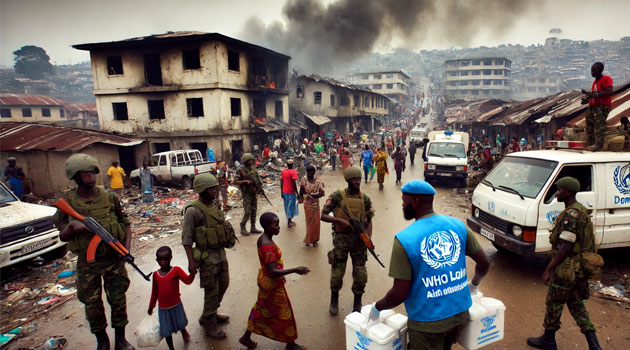
843 people killed, 3,082 injured since M23’s Goma takeover: WHO » Capital News
NAIROBI, Kenya, Feb 7 – The World Health Organization (WHO) on Friday reported 843 people had been killed in Goma, DRC, since January 26, when the war escalated, with 3,082 others injured.
The agency warned of rising trauma cases amid fighting between M23 rebels and government forces with allied troops.
WHO further warned the numbers would increase further as more injured individuals reach health facilities and more bodies are retrieved from the streets.
The health agency described the situation as tense and volatile, with immense healthcare needs.
“The sight of bodies lying uncared for is distressing. Though the bodies of people who have died from injury do not generally carry or spread disease, it is the right of the deceased to be identified and receive a proper burial. It is also important for the living to know that their loved ones have been cared for,” the statement read.
WHO reported that over 70 health facilities in North Kivu have been affected by the conflict, with some completely destroyed.
Fleeing health workers
Others are struggling to resume operations, as health workers have either fled or are working under limited resources, putting their lives at risk.
The organization also noted that some ambulances have been damaged, while essential healthcare services, including cancer treatment, diabetes and hypertension management, mental health support, and routine medical care, have been severely impacted due to medicine shortages and overburdened or absent healthcare workers.
Additionally, WHO reported that a rapid assessment of 10 healthcare facilities in and around Goma revealed a concerning rise in sexual and gender-based violence.
So far, 21 out of 45 displaced survivors of gang rape have been admitted to two hospitals.
“The water supply in Goma was disrupted and has only partially resumed, forcing people to use water from the lake, heightening the risk of cholera outbreaks. Nearly 600 suspected cases of cholera and 14 deaths were reported in North Kivu between January 1 and 27,” the statement added.
Relief efforts
WHO said it has deployed emergency medical supplies, hygiene and water treatment kits, and tents to increase hospital capacity by 1,000 beds. However, it has called for additional support, as more resources are urgently needed.
The agency is preparing further aid deliveries as part of a European Civil Protection and Humanitarian Aid Operations (ECHO)-led effort to transport critical supplies.
It also urged the urgent reopening of Goma Airport, a critical supply lifeline, while exploring alternative delivery routes.
Furthermore, WHO highlighted the significant impact of the United States’ recent decision to freeze foreign aid on relief efforts in the Democratic Republic of the Congo.
The US contributed 70 per cent of the country’s humanitarian response in 2024.
The agency warned that a reduction in aid will have severe consequences on public health, despite ongoing contributions from other donors, including the European Union, the United Kingdom, and WHO’s Contingency Fund for Emergencies.
“Ultimately, we call for peace and an end to the unimaginable and prolonged suffering of the people in this region,” the statement concluded.
Meanwhile, the United Nations Human Rights Council (UNHRC) has announced a special session on February 7, 2025, to address the deteriorating human rights situation in Goma following the city’s fall to Rwanda-backed M23 rebels.
The M23 rebels, who seized Goma on January 26, declared a humanitarian ceasefire just days ahead of a summit in the Tanzanian city of Dar es Salaam, where DRC President Félix Tshisekedi and Rwandan President Paul Kagame are expected to attend.
The capture of eastern DRC’s largest city has displaced hundreds of thousands of people and raised fears of a wider regional war.
Congo accuses Rwanda of using the M23 to plunder valuable mineral resources, while Rwanda insists it is acting in self-defense and to protect ethnic Tutsis.